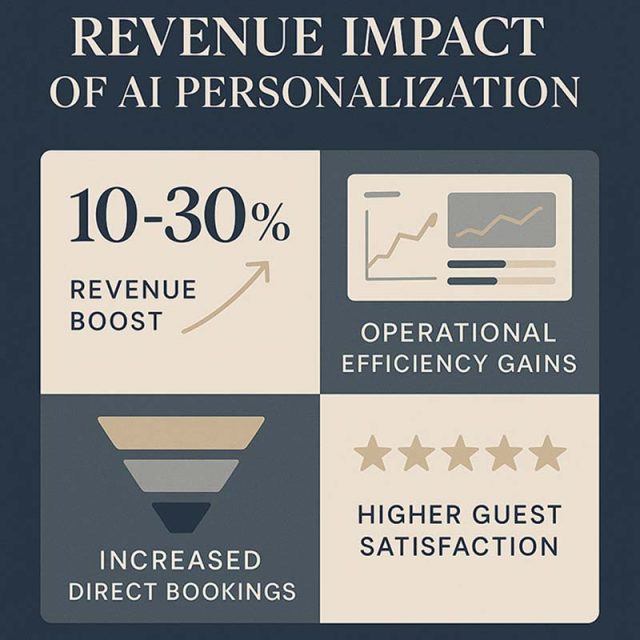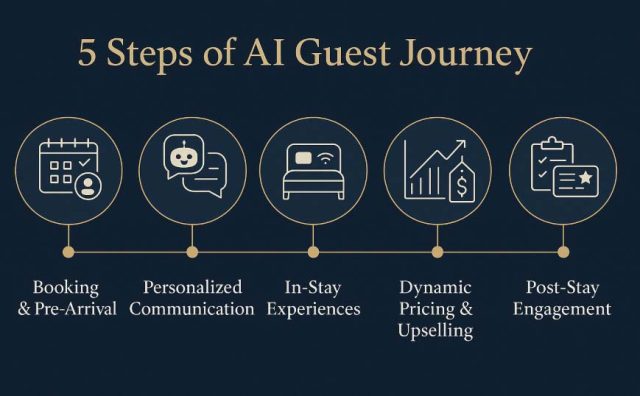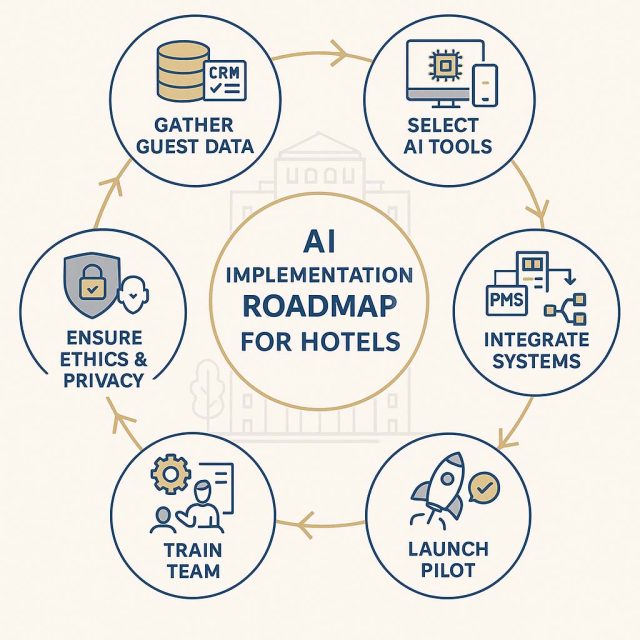In today's competitive hotel landscape, personalization isn’t just nice to have—it’s essential. Artificial Intelligence empowers hotels to go beyond standard service, enabling one‑to‑one guest interactions that feel thoughtful, intuitive, and emotionally connected. Here's how AI transforms the guest journey and boosts both loyalty and revenue.
Why AI‑Powered Personalization Matters
Learn how AI dramatically improves guest experience, cuts routine tasks, and powers marketing that truly speaks to your audience.
- Better guest experiences: AI dives into data, past stays, booking patterns, online behavior, to tailor recommendations and upsells. One study shows hotels using personalization can boost revenue by 10–30%.
- Operational efficiency: Let AI handle routine tasks like chatbot replies, pre‑arrival messages, or real‑time pricing adjustments. This frees up staff to focus on human‑centric service.
- Intelligent marketing: Hyper‑targeted campaigns resonate more deeply, whether via email or digital ads. AI dynamically adjusts offers based on guest profiles and behaviors.
Platforms like Verity Guest, a hotel-specialized CDP/CRM that unifies data from PMS, POS, web, and loyalty systems, use AI-driven guest DNA and real-time orchestration to deliver hyper-relevant interactions, leading to higher satisfaction, more direct bookings, and stronger loyalty.

How It Works: AI Across the Guest Journey
From booking to post-stay, see how AI elevates each interaction step-by-step.
- Booking & Pre‑Arrival
Imagine returning guests choosing room preferences - pillow type, floor, even desired check-in time, suggested automatically based on their history. Hilton, for example, uses AI-driven reservation systems that anticipate these preferences, creating memorable first impressions. - Personalized Communication
AI chatbots handle FAQs 24/7, with ability to escalate complex requests to staff. Luxury chains are blending digital efficiency with human warmth, preserving the personal touch. - In-Stay Experiences
AI systems can adjust room lighting, temperature, and entertainment based on guest profiles. Virgin Hotels implemented a platform that customizes these settings—raising guest satisfaction and loyalty. - Dynamic Pricing & Smart Upselling
Real-time rate optimization adjusts pricing based on demand, local events, and competitor behavior. Meanwhile, AI suggests upsells—spa treatments, upgrades, F&B offers, that feel genuinely relevant.A notable example of such a system is RateParity. Their Conversion Rate Optimization (CRO) platform features an AI-powered chatbot that enhances guest engagement and drives direct bookings. While not focused on AI-driven personalization, the chatbot provides 24/7 support, answers FAQs, and promotes special offers, contributing to increased conversions and customer satisfaction. - Post-Stay Engagement
Follow-ups, loyalty perks, and personalized offers ensure continued engagement. AI helps build ongoing relationships long after check-out.

Success Stories: Leading the Way
Real-world examples from top brands, showcasing how practical AI adoption delivers tangible value.
- Marriott + Adobe: At Adobe Summit 2025, Marriott demonstrated email campaigns enabled by Adobe’s AI agents, yielding over 70% faster content creation and hyper-targeted audience reach.
- Hilton’s Custom Booking: Their system now suggests guest-specific amenities during booking, building delight even before arrival.
- Virgin Hotels: Automated room settings and service recommendations based on prior interactions led to higher guest satisfaction and repeated visits.
Implementation Guide – Your Roadmap to Personalization:
To bring AI personalization into your hotel, start by gathering all guest data:
reservations, CRM, web visits, loyalty details to build complete profiles.
Next, select the right AI tools that suit your goal, whether chatbots for guest interaction, pricing engines like Duetto or IDeaS, or recommendation platforms.
Then, integrate these tools seamlessly across your operational systems: PMS, CRM, analytics,
so they work together smoothly.
Launch a small pilot, maybe a chatbot on your site or a smart room feature, collect guest feedback, then refine and expand based on real results.
Ensure your team understands how AI supports their roles, empowering them to focus on genuine hospitality instead of routine tasks.
Finally, embed ethics and privacy: secure data, obtain clear guest consent, and maintain human oversight on key decisions.

Challenges & How to Overcome Them
Common barriers to AI implementation—and simple strategies to get around them.
- Fragmented data: Start by unifying guest data across platforms to build a cohesive profile.
- Maintaining “human feel”: Use AI for efficiency, but keep high-touch moments led by people.
- Ethical considerations: Use AI openly, protect data, and let guests customize personalization preferences.
The Future Is Now
A forward-thinking view on where AI in hospitality is heading, and how to stay ahead.
AI isn’t a futuristic concept, it’s reshaping hospitality today. Your website can become an AI gateway. Social platforms evolve into booking hubs. In-hotel experiences will increasingly be dynamic, interactive, even voice or avatar-led Hospitality.today.
Success will go to those who balance technological capability with human creativity, who empower staff to act where AI cannot. Those who implement now aren’t just improving operations—they're setting the standard for guest experiences in a digital world.
In short: AI‑driven personalization transforms every stage of the guest journey, from pre‑arrival to post‑stay, creating memorable interactions, boosting revenues, and reinforcing loyalty. If you're steering digital strategy for a hotel brand, embracing AI personalization isn’t optional anymore, it’s your pathway to differentiation.

